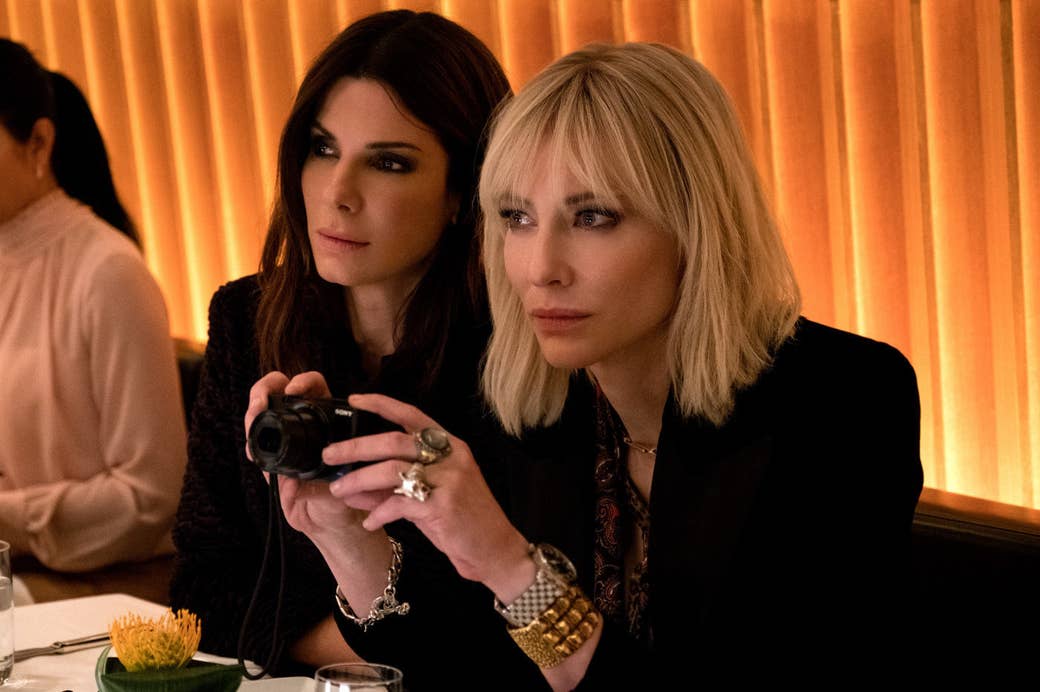
Scamming is made for the screen. In its more involved forms, scamming is basically a let's-put-on-a-show plot — costumes, characters, choreography — with the bonus of added thieving. Scammers steal from the susceptible and give to themselves, which is not how Robin Hood did things, but is a form of stylish self-interest that can feel like a karmic balancing of scales, when the target is right and when we're allowed to take vicarious pleasure in the process. There are all sorts of dark stories about grifting — The Grifters, the great 1990 Stephen Frears thriller, is the kind of viewing experience that leaves you in need of a Silkwood shower afterward. But when it comes to taking uncomplicated pleasure in scams, it's only blissful, light-on-their-feet fare — like 1973's The Sting, 2002's Catch Me If You Can, 2000's Nine Queens, and the Ocean's trilogy, whose women-led spinoff Ocean’s 8 is now in theaters — that will do. It's only onscreen that scamming can exist in its purest and most guilt-free fantasy form, where the only ones who get hurt are the ones who deserve it.
That’s why, maybe, when imitation heir Anna Delvey captivated the imagination of the internet earlier this month, one of the first impulses was to dream-cast her story for a screen adaptation that seemed not just desirable but inevitable. As it turns out, it was — on Friday it was announced that Shonda Rhimes, who'd already dipped a toe into con artist fantasies with her short-lived ABC show The Catch, would be bringing Delvey's story to streaming as the first series in Rhimes' landmark Netflix deal.
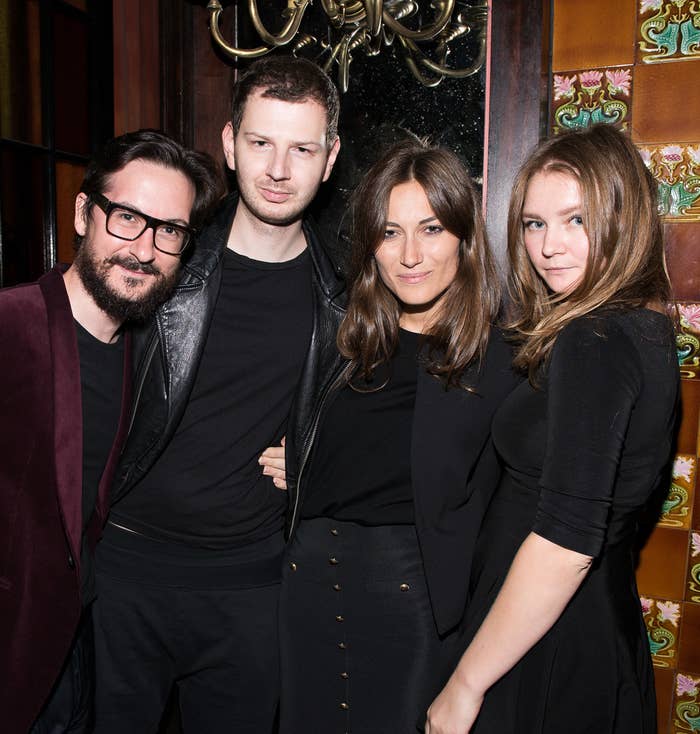
Onscreen, Delvey's saga — the crown jewel in what has been proclaimed a prime season for grifting, complete with T-shirts — can be buffed and honed into something neater. Maybe it'll become a satire of New York scenesterism, or a tale of the rise and fall of a gatecrashing antiheroine, or a dark comedy about a new American dream of wangling your way into building a “dynamic visual-arts center” with other people's money. It's onscreen where the less fun aspects of her tale — the inconvenient blips of collateral damage to victims who can't easily bounce back, like the Vanity Fair staffer who was saddled with a credit card bill amounting to more than her yearly salary, or the small businesses contracted for projects they were never paid for — can either be more fully contended with or smoothed away.
Real-world scams are almost never as discriminating in their fallout as we might like them to be. And yet somehow, in this summer of scamming, IRL grift is easily outpacing the current big-screen visions of cons, heists, hustling, and fraud for sheer escapist satisfaction. We've had the Albany dude who's appeared on TV passing himself off as a British expert on the aristocracy, the 21-year-old Londoner ordering $1,200 shots of rare whiskey and then skipping out on the bill in DC, and that fake Saudi prince in Miami. Recent dives into the corporate sagas of Theranos and Vice have made it clear that the difference between scamming and savvy business maneuvering is all in the eye of the investor. And of course there's Delvey, our lady of cons, who has reportedly been calling producers and performers from Rikers about who she wants playing her when her story is adapted.
In contrast, the movies right now are offering up a curiously unsatisfying slate of Ocean's 8, Solo, and American Animals. You know what a lady heist movie, a Star Wars space Western, and a docudrama about college students who break bad have in common, beyond their scam-adjacence? Whatever pleasures they offer, they're disappointingly uninterested in the glee of the grift; none of them manage to provide the kind of giddy thrill that the evening news has been supplying lately.
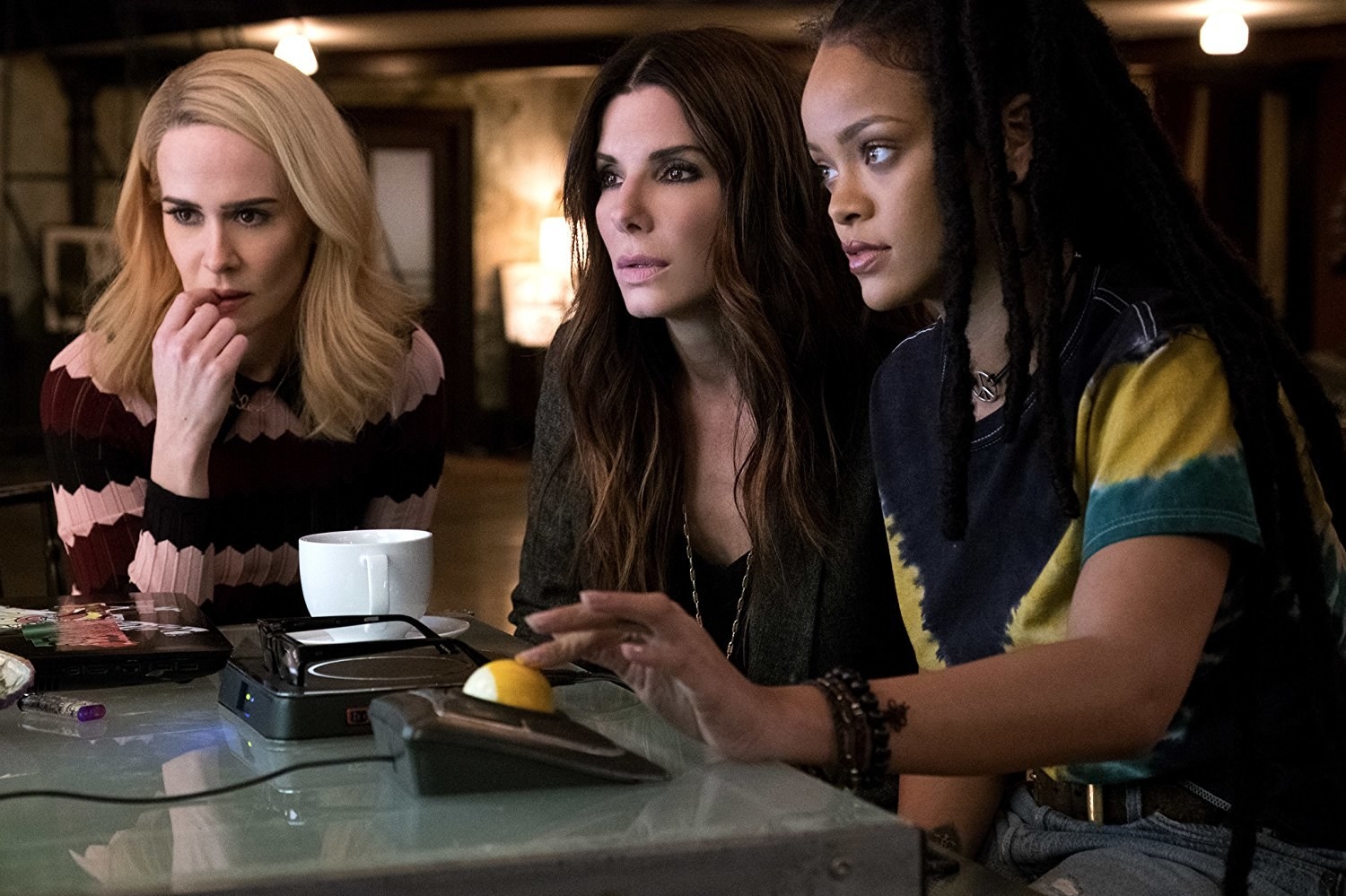
There is, for instance, just not enough scamming in Ocean's 8. It's a strange thing to have to say about a movie that gathers a group of glamorous women together for what is essentially a giant scam involving a diamond necklace, the Met Gala, and some desultory revenge on an ex. But it's true — Ocean's 8, which is produced but not directed by trilogy creator Steven Soderbergh (who was himself remaking a 1960 Rat Pack film), is a cozy hangout movie forced into the rough outline of a heist flick by the realities of Hollywood, where everything has to be a sequel, remake, or reboot. If gender-flipping an existing hit is what it takes to get Sandra Bullock, Cate Blanchett, Anne Hathaway, Mindy Kaling, Sarah Paulson, Awkwafina, Rihanna, and Helena Bonham Carter in a feature together, so be it. But there's no denying that the heist and the general nods toward the earlier films come across like obligatory motions that must be gone through in order to showcase the cast in fab outfits and show them bonding over Tinder.
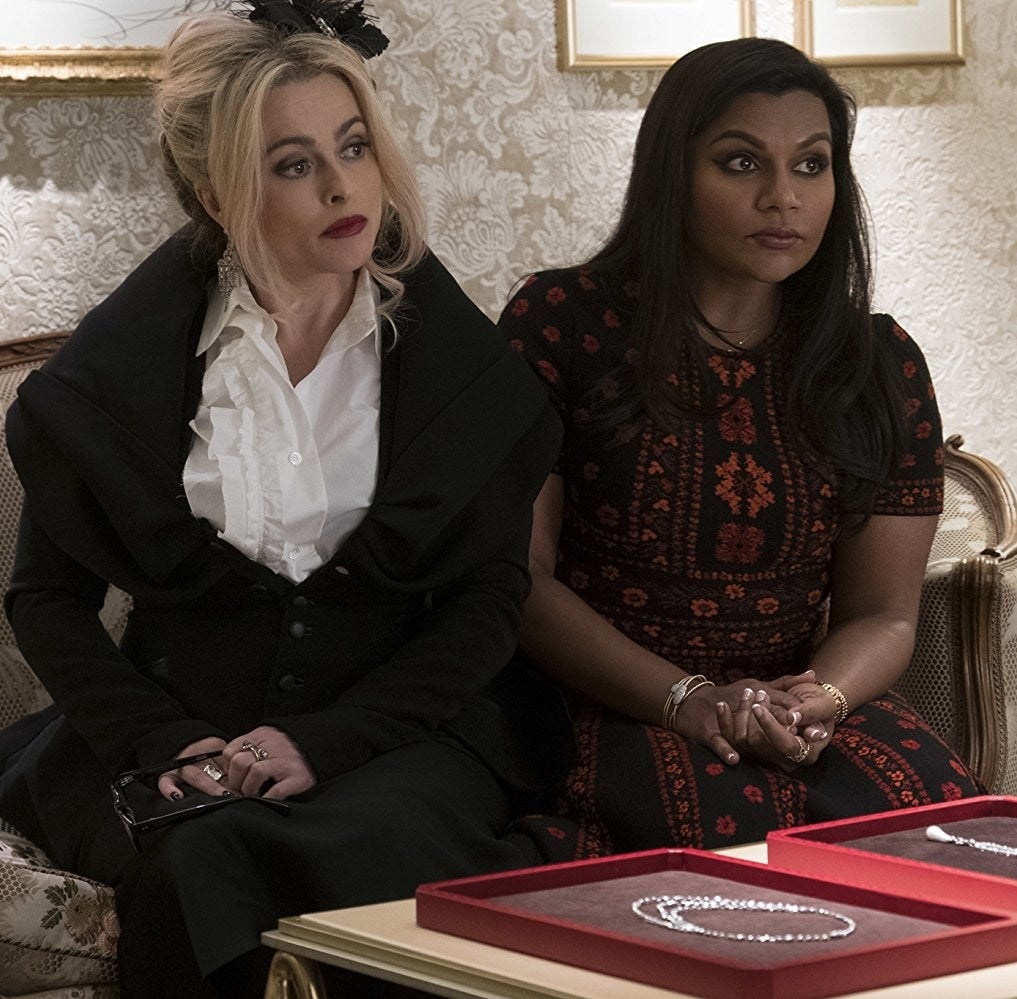
There is one genuinely joyful sequence of scamming in Ocean’s 8, and it's right at the start of the movie, after Debbie Ocean (Bullock) gets paroled from prison, exiting in the evening gown and heels in which she was arrested. She heads to Bergdorf, where she huffy-rich-ladies her way into getting the high-end goods she's shoplifting apologetically packaged up for her. She's carrying armfuls of filched items by the time she rolls up to a five-star hotel, snags a stranger's suitcase, and proceeds to skillfully secure herself a free room to relax in, all worn out from a day of short cons. It's a sequence about basking in luxury, and in the certainty that the best way to do so is to steal, because attempting to access such rarefied spaces and things by way of hard work is a rigged fool's game — and isn't that the reason we love stories about scammers in the first place?
But that scene also highlights the lack of gusto in the longer-form criminality that follows, a training-wheels version of a heist in which obstacles are overcome with exasperating ease, and in which the very limited instances of conflict get ironed out as soon as they crop up. Debbie in particular, who spent five years in prison devising a supposedly foolproof plan in which the first step involves finding and recruiting a famous fashion designer into a life of crime, never clicks together as a character after that opening scene. She may start the movie satisfying her own whims with purloined opulence, but she ends it paying obeisance to a character from the old trilogy, stuck in his shadow. Then again, another character in the movie offers an even less concrete motivation for her heist involvement — her lack of female friends.
The heist movie has been a mostly masculine tradition, and Ocean's 8 weirdly affirms that by being indifferent toward the sting at its center — like it's so intent on proving John Mulaney's “Ocean's 11 with women wouldn't work” bit wrong that it ends up overcorrecting and eliminating all suspense or dramatic tension. When the jeweler played by Kaling asks if they couldn't just go to the Met Gala instead of robbing it, you can imagine a chattier, funnier version of the movie relieved of its other obligations. And that, all in all, would likely have been more fun to watch.

There are fewer affirmations of friendship and more dramatic betrayals in Solo, but it also turns out to be a movie about a scammer that's not all that interested in scamming. Which is funny, given that it's the story of how Han Solo (Alden Ehrenreich) got to be the roguish reluctant ally of the original Star Wars trilogy, tracing him back to his early days as a street kid growing up in thrall to a local gang. Young Solo goes from an orphan trying to scam his way off the planet, to an Imperial soldier trying to scam his way out of the military, to a thief trying to scam his way out of debt to a crime syndicate. And yet it's always explained as a noble effort for his lover Qi'ra (Emilia Clarke), and he's never burdened with acting on his own behalf. Solo is more intent on confirming its hero's inherent hero-ness — that he is and has always been, as he's flat-out assured at one point, “the good guy.”
This amounts to a defanging of the Star Wars universe's most beloved scoundrel, but it also makes for a movie that seems mostly apologetic about its acts of wrongdoing. Much has been reported about Solo's troubled production and subsequent box office failures, and whether audiences are already burned out on Star Wars. But watching the film, the clearest explanation for why it has disappointed is its general joylessness. Solo portrays its main character as a cocky, slum-educated scrapper who doesn't even grab a few cocktails when he finds himself at a plush gangsters’ party, midway through the movie. It's no wonder that the hedonistic card-shark Lando Calrissian, played by Donald Glover with the lazy confidence and unapologetic sensuality of someone who has definitely boinked a droid, is such a scene-stealer — someone needed to have fun around here.
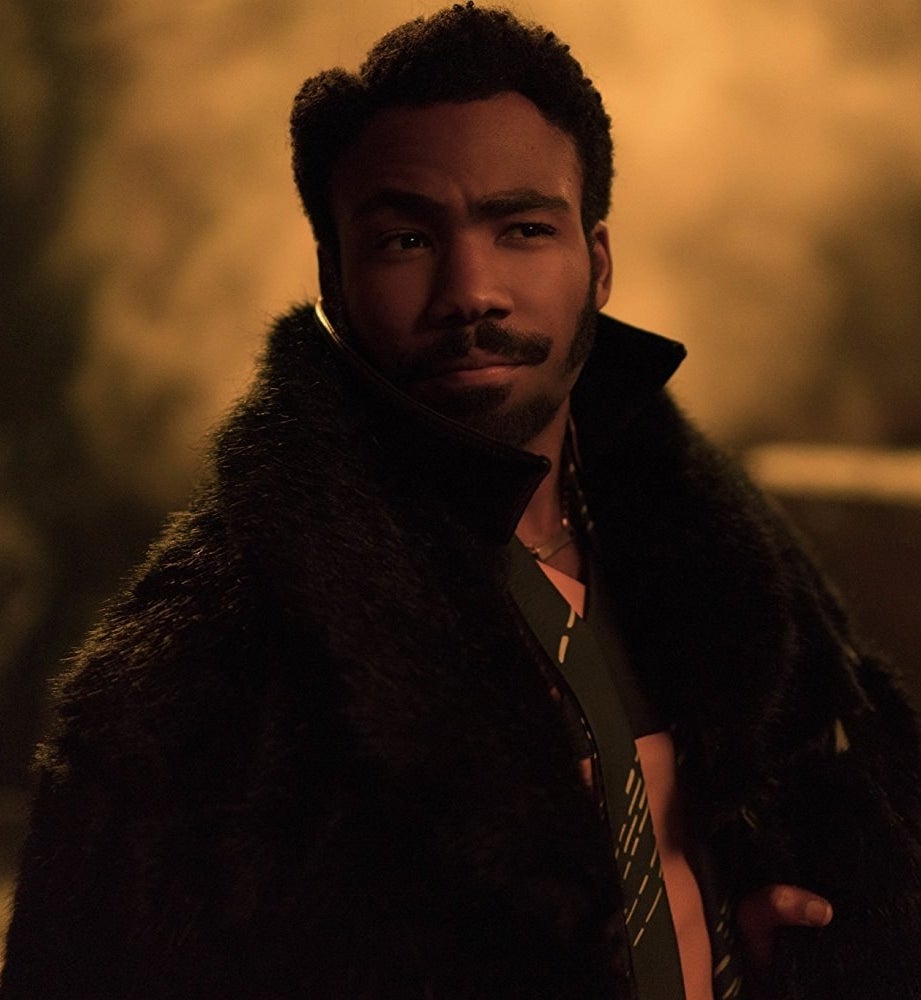
There is, at least, some fun to be had in American Animals, Bart Layton's fourth wall–breaking movie based on real crimes committed in 2004 by four Kentucky college students who attempted to steal rare books from the Transylvania University library. They're suburban guys with no significant criminal history, but they've watched some movies. (They come up with elaborate disguises, and they borrow a few of the aliases used in Reservoir Dogs.) They have a grand time going to New York to meet with a mysterious fence. But the point of the film, which intercuts footage of actors Evan Peters, Barry Keoghan, Blake Jenner, and Jared Abrahamson with periodic interviews with the actual people they're playing, is that the fun quickly evaporates as you confront the contrast between how these inexperienced kids imagine the heist will go versus the much messier, darker reality they face when they stop dreaming and actually act.
The characters in American Animals want to break out of the mundane lives to which they feel they've been consigned — as one character shouts, “Which fucking future are you worried about? The one that's fucking indistinguishable from everyone else's? Where you fucking beaver away to get the shit you're told you need to have by some fucking asshole who's going to tell you what a great big success you are once you get it all?” And yet when the fantasy of prepping for the big day gives way to having to hurt someone, and having to put yourself at risk of being caught, what becomes clear is that this is a movie about the fallout from and the harm done during a heist. It's a cleverly assembled movie, but for anyone in search of scam escapism, it's a tremendous buzzkill.
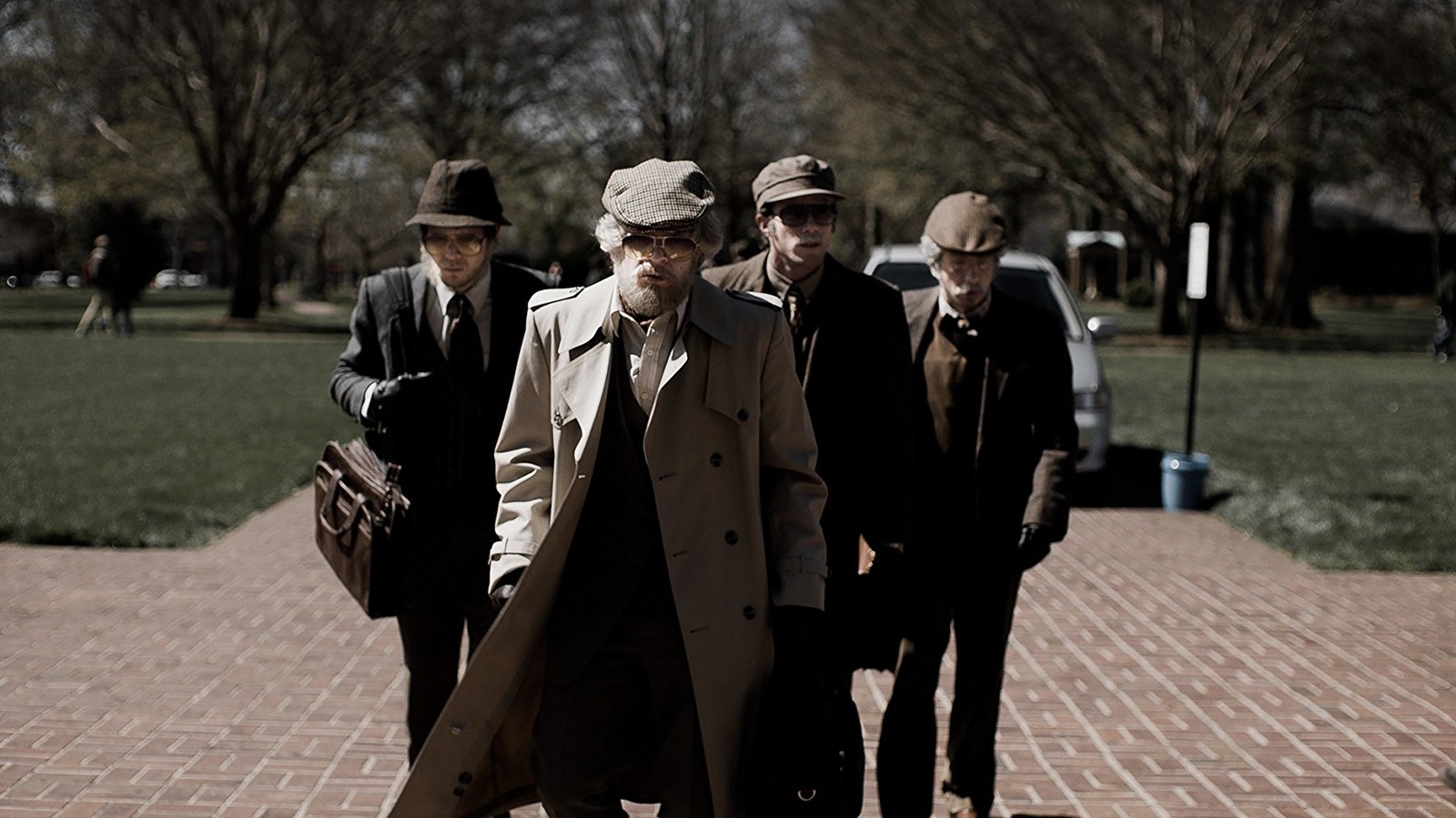
Caper movies — the lighter ones, at least — tend to implicitly be in appreciation of and in service to movie stardom. The Sting is a tribute to Paul Newman and Robert Redford's nuclear-level combined appeal; Ocean’s Twelve, the second and most indulgent installment of the trilogy, basically served as a way for its celeb-heavy ensemble to jaunt around Italy in some exceptionally picturesque ways. In 2009's Duplicity, Julia Roberts and Clive Owen play two rival spies gone private-sector who dream up a scheme to get rich after spending three days rolling around an (of course) five-star hotel room, and you root for them because they look fabulous, like they deserve to have the money because they've shown themselves to be terrific at spending it.
Any scammer is also inherently a kind of self-made star — you set the stage, you play a role. And then, at least in scam fantasies, you pull one over on someone who deserves it, either because they're rich, or they're bad, or they're conveniently both rich and bad. So there is something about Anna Delvey's relative normalcy — she does not look like a model, or a famous actor, or one of the sorts of royals whose antics get tracked in the tabloids — that stands as a contrast to the superhuman attractiveness of these glamorous scammers onscreen. That her story, in particular, nevertheless manages to hit the aspirational sweet spot that this summer's movies have not speaks to its subversive streak.
Delvey’s scamming resonates because it does feel so imperfectly heroic, as she crashed through structures of wealth, brashly passing herself off as a member of the economic elite and demanding the leeway the elite are deferentially allotted. She did do some un-cinematic harm beyond party tabs and taking up rooms in hip downtown hotels. (Who knew they could be convinced to let you check in without so much as a credit card on file?) But it's balanced out by the degree to which what she did ended up highlighting the fundamental grift of income inequality, which is that when you already have money, or act like you do, other people are much more likely to give you more of it. And in making that point — where the summer's movies have whipped up different scams onscreen that feel respectively indifferent, overly earnest, or a shade too dark — this real-life story feels just right. It's watching someone decide that, because the game is rigged, they might as well cheat. ●
